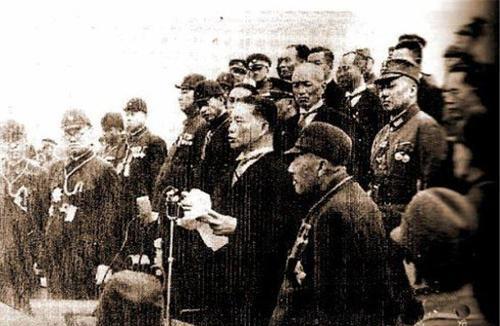
On December 18, 1938, after plotting, Wang Jingwei led his henchman Zhou Fohai and others to sneak out of Chongqing, and on the 29th, in Hanoi, Vietnam, he issued a "Yan Telegram" to justify Japan's invasion of China and persuade the Nationalist government to conduct so-called "peace" negotiations with Japan, marking that he had openly surrendered to the enemy and became a traitor. On March 30, 1940, Wang Jingwei formally established a puppet Nationalist government in Nanjing, acting as a pawn and accomplice to the Japanese invasion.
He was not willing to be the second in command of Chiang Kai-shek
Wang Jingwei joined the Chinese League in 1905, and in 1924, he joined the Kuomintang "First Congress" and was elected as a member of the Central Executive Committee; In 1925, he became chairman of the Nationalist Government and chairman of the Kuomintang Military Commission in Guangzhou, and his status was higher than that of Chiang Kai-shek. However, Chiang Kai-shek created the "Zhongshan Ship Incident" in 1926 to attack the Communists, forcing Wang Jingwei to go abroad and become the chairman of the Kuomintang Military Commission; He also put forward the "case of sorting out party affairs" and became chairman of the Standing Committee of the Kuomintang Central Committee and commander-in-chief of the National Revolutionary Army, seizing the Kuomintang's great power in the party, government, and army, squeezing out Wang Jingwei's forces, and placing himself above Wang Jingwei.
Since then, although Wang Jingwei has vigorously engaged in political maneuvers and forced Chiang Kai-shek to step down, he has been subordinate to Chiang Kai-shek most of the time, and many times he has no real power. Wang Jingwei was extremely dissatisfied with Chiang Kai-shek's monopoly of power, and he was even more unwilling to sit in the second chair, but he could not fight the old Chiang Kai-shek, so he could only embark on the road of treason and surrender to the enemy in order to sit in the first chair of the puppet regime.
Afraid to cooperate with the Communist Party
During the Great Revolution, Wang Jingwei followed Sun Yat-sen for a long time, cooperated with the Communist Party, and adhered to the three major policies of "uniting with Russia, uniting with the Communist Party, and supporting peasants and workers". After Chiang Kai-shek launched the "April 12" counter-revolutionary coup, Wang Jingwei also became the chairman of the Wuhan National Government with the support of progressive forces and other important positions, competing against the Nanjing regime established by Chiang Kai-shek.
However, Wang Jingwei eventually betrayed his faith, embarked on the road of anti-communism and anti-people, and launched the "July 15" counter-revolutionary coup, and put forward the opposition slogan of "it is better to kill a thousand people in vain than let one person slip through the net", and wantonly slaughtered Communists and revolutionary masses. After the outbreak of the War of Resistance Against Japanese Aggression, the Kuomintang and the Communists achieved the second cooperation, and Wang Jingwei advocated compromise with the Japanese aggressors, vigorously opposed the anti-Japanese policy of the United Communists, and chose the road of defecting to the Japanese Kou.
The pro-Japanese idea of studying abroad in the past
Wang Jingwei studied in Japan in 1904 and learned about Japan's political, economic, cultural and other social conditions, and developed pro-Japanese ideas. After returning to China, he had many contacts with the Japanese, and his pro-Japanese thinking further developed, believing that only by effectively france and Japan could the country prosper. When Japan launched the "918" incident of invading China, he went around propagating the national defeatist sentiment that "war must be defeated."
After the outbreak of the All-out War of Resistance Against Japanese Aggression, he wantonly spread the fallacy of "the fallacy of the subjugation of the country and the theory that China and Japan are "brotherly states," advocated peace talks with Japan to "save the country," exchanged letters with the Japanese aggressors, exchanged messengers, and carried out a series of compromise and surrender activities, until he finally confessed to being a thief and his father.
The Japanese side spared no effort to induce the landing
In addition to Wang Jingwei's sentiments of flattery and lust for power, and the fact that milk is the internal cause of the mother, the external cause of Japan's abduction policy has also played a role. In particular, after the advent of the stage of the War of Resistance Against Japanese Aggression, the Japanese and Kou changed their policy of invading China and concentrated their main forces on attacking the anti-Japanese base areas under the leadership of the Communist Party because the front line was too long, the manpower, material resources, and financial resources were insufficient, and the anti-Japanese base areas threatened their rear areas, and Wang Jingwei and others stepped up their political inducements. In November 1938, Japanese Prime Minister Konoe issued a series of statements to China: "Put forward the three principles of "good neighborliness and friendship, joint defense of communism and economic cooperation" as a condition for inducing surrender.